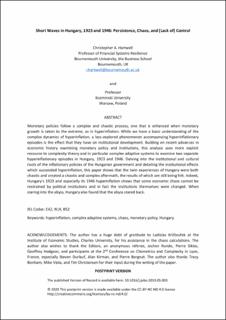Bitte benutzen Sie diese Kennung, um auf die Ressource zu verweisen:
https://doi.org/10.21256/zhaw-22613| Publikationstyp: | Beitrag in wissenschaftlicher Zeitschrift |
| Art der Begutachtung: | Peer review (Publikation) |
| Titel: | Short waves in Hungary, 1923 and 1946 : persistence, chaos, and (lack of) control |
| Autor/-in: | Hartwell, Christopher A. |
| et. al: | No |
| DOI: | 10.1016/j.jebo.2019.05.003 10.21256/zhaw-22613 |
| Erschienen in: | Journal of Economic Behavior & Organization |
| Band(Heft): | 163 |
| Seite(n): | 532 |
| Seiten bis: | 550 |
| Erscheinungsdatum: | 2019 |
| Verlag / Hrsg. Institution: | Elsevier |
| ISSN: | 0167-2681 |
| Sprache: | Englisch |
| Schlagwörter: | Chaos; Complex adaptive system; Hungary; Hyperinflation |
| Fachgebiet (DDC): | 332: Finanzwirtschaft |
| Zusammenfassung: | Monetary policies follow a complex and chaotic process, one that is enhanced when monetary growth is taken to the extreme, as in hyperinflation. While we have a basic understanding of the complex dynamics of hyperinflation, a less-explored phenomenon accompanying hyperinflationary episodes is the effect that they have on institutional development. Building on recent advances in economic history examining monetary policy and institutions, this analysis uses more explicit recourse to complexity theory and in particular complex adaptive systems to examine two separate hyperinflationary episodes in Hungary, 1923 and 1946. Delving into the institutional and cultural roots of the inflationary policies of the Hungarian government and detailing the institutional effects which succeeded hyperinflation, this paper shows that the twin experiences of Hungary were both chaotic and created a chaotic and complex aftermath, the results of which are still being felt. Indeed, Hungary's 1923 and especially its 1946 hyperinflation shows that some economic chaos cannot be restrained by political institutions and in fact the institutions themselves were changed. When staring into the abyss, Hungary also found that the abyss stared back. |
| URI: | https://digitalcollection.zhaw.ch/handle/11475/22613 |
| Volltext Version: | Akzeptierte Version |
| Lizenz (gemäss Verlagsvertrag): | CC BY-NC-ND 4.0: Namensnennung - Nicht kommerziell - Keine Bearbeitungen 4.0 International |
| Gesperrt bis: | 2022-05-31 |
| Departement: | School of Management and Law |
| Organisationseinheit: | International Management Institute (IMI) |
| Enthalten in den Sammlungen: | Publikationen School of Management and Law |
Dateien zu dieser Ressource:
| Datei | Beschreibung | Größe | Format | |
|---|---|---|---|---|
| 2019_Hartwell_Short-Waves-Hungary.pdf | Accepted Version | 964.01 kB | Adobe PDF |  Öffnen/Anzeigen |
Zur Langanzeige
Hartwell, C. A. (2019). Short waves in Hungary, 1923 and 1946 : persistence, chaos, and (lack of) control. Journal of Economic Behavior & Organization, 163, 532–550. https://doi.org/10.1016/j.jebo.2019.05.003
Hartwell, C.A. (2019) ‘Short waves in Hungary, 1923 and 1946 : persistence, chaos, and (lack of) control’, Journal of Economic Behavior & Organization, 163, pp. 532–550. Available at: https://doi.org/10.1016/j.jebo.2019.05.003.
C. A. Hartwell, “Short waves in Hungary, 1923 and 1946 : persistence, chaos, and (lack of) control,” Journal of Economic Behavior & Organization, vol. 163, pp. 532–550, 2019, doi: 10.1016/j.jebo.2019.05.003.
HARTWELL, Christopher A., 2019. Short waves in Hungary, 1923 and 1946 : persistence, chaos, and (lack of) control. Journal of Economic Behavior & Organization. 2019. Bd. 163, S. 532–550. DOI 10.1016/j.jebo.2019.05.003
Hartwell, Christopher A. 2019. “Short Waves in Hungary, 1923 and 1946 : Persistence, Chaos, and (Lack of) Control.” Journal of Economic Behavior & Organization 163: 532–50. https://doi.org/10.1016/j.jebo.2019.05.003.
Hartwell, Christopher A. “Short Waves in Hungary, 1923 and 1946 : Persistence, Chaos, and (Lack of) Control.” Journal of Economic Behavior & Organization, vol. 163, 2019, pp. 532–50, https://doi.org/10.1016/j.jebo.2019.05.003.
Alle Ressourcen in diesem Repository sind urheberrechtlich geschützt, soweit nicht anderweitig angezeigt.